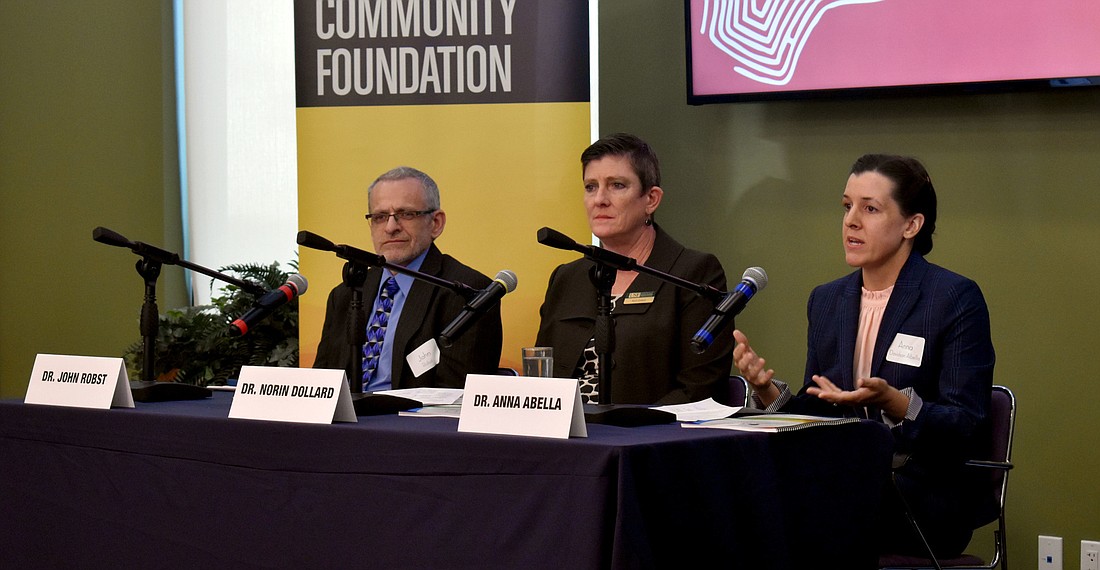- February 4, 2026
-
-
Loading

Loading

A month before Alicia Crowell moved from New York to Florida, her daughter attempted suicide — her second attempt in a few years.
The girl, a straight-A student and competitive dancer, was placed directly into an inpatient treatment facility in New York. Upon her release, the family moved to Florida where Crowell said her daughter initially improved, then again struggled.
Fearing the worst, her mother's search for appropriate care ultimately led the family to a facility 130 miles away in Orlando. But not before a third attempt at suicide.
It's that kind of frantic search that a local scan of mental-health care providers, funded by the Charles & Margery Barancik Foundation and Gulf Coast Community Foundation and conducted by University of South Florida, is designed to ease.
The scan looked at mental health services for people up to the age of 24 in Sarasota County with a goal of identifying systemic strengths and gaps. Nationally, the average delay between the onset of symptoms and treatment of young people is eight to 10 years.
Research was conducted from July 2018 to January 2019, and, during that time, researchers found 12.1% of Sarasota County's 24 and under population (10,177) likely have an untreated mental illness. To better understand the need for mental health care in Sarasota County, researcher Anna Abella looked at
county demographics and collected feedback from consumers of services and stakeholders.
Florida Department of Health in Sarasota health officer Chuck Henry said one must take into consideration the Adverse Childhood Experiences (ACEs) test, because children who score two more more ACEs are four times more likely to have substance abuse or mental health issues in adulthood.
Laura Kingsley, assistant superintendent and chief academic officer of Sarasota County Schools, said half of the district's 4,300 students live in poverty — one ACE point.
Furthermore, in the 2017-18 school year there were 42 kids who had plans to commit suicide and 293 who had serious thoughts of suicide, Kingsley said. Now, in the incomplete 2018-19 school year, those numbers have increased to 111 and 492, respectively.
“Public health always likes to work upstream,” Henry said. “By that I mean, we see people drowning in the river and we pull them out and pull them out. Pretty soon, we need to get smart and go upstream and figure out why they are jumping in the first place.”
USF researcher John Robst found that untreated mental illness costs Sarasota County $86,179,317 annually.
The total cost can be broken down into direct cost such as incarceration and treatment costs or indirect costs such as unemployment or lost productivity.
“What happens with untreated mental illness is, it doesn’t just affect them today,” Robst said. “It affects the person throughout their life. If somebody commits suicide, society has lost them for the rest of their expected lifetime.”
There are about five Sarasota County suicides in the researched age group annually, Robst said, with the average cost of each around $2 million. Even so, Robst said the $86 million may be too low a number.
“I’ll be the first to admit, I think it is an understatement of cost because it doesn’t account for the cost for families,” Robst said. “It’s not just the cost of the child. The $86 million, that’s for the child only, but what about the ripple effects seen throughout the families, society, because of the mental illness?”
After treatment, Crowell’s daughter is doing well. She has even started an Active Minds program at her school to advocate for mental health and plans to go into mental health advocacy in college.
John Annis, senior vice president for collaboration and impact of the Barancik Foundation, said moving forward, the sponsors of the scan would like to collaborate with local organizations.
“We don’t want to create a new group,” Annis said. “We want to say, ‘How can we help local groups take these frameworks and get where we, as a county, want to go?’”
Future plans to better mental health care include a three-pronged approach: strengthening the system of care, supporting families and educating and advocating.
Plans to accomplish those main points include investing in universal prevention, establishing coordinated entry points for families to access treatment and eliminating the stigma associated with receiving mental health care.